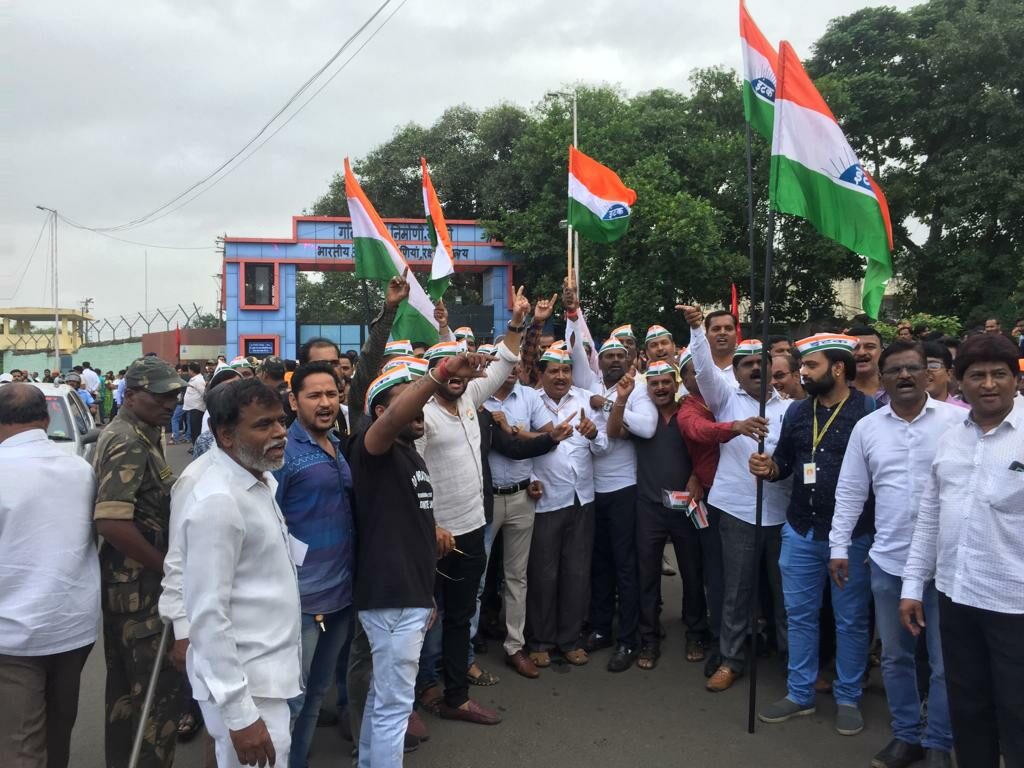Ordnance Factories strike called off

New Delhi, August 24, 2019 : Continuing the process of dialogue which had started from 14 August 2019, the fourth meeting was held yesterday with the office bearers of AIDEF, INDWF, BPMS and CDRA under the Chairmanship of Secretary, DDP. While reaffirming that the proposed corporatisation of OFB is under examination of the Government, Secretary, DDP patiently listened to the concerns expressed by the Employees Federations regarding how the benefits/interests of employees in terms of wages, health facilities and other service matters may be affected due to corporatisation of OFB.
The Employees Federations inter-alia suggested that their views should be considered while preparing the roadmap for increasing the turnover of the proposed entity from the current levels. After detailed deliberations, it was agreed to recommend to the Government, the setting up of a High Level Official Committee to interact with Employees Federations to examine their concerns and other aspects of the proposed new entity. The Federations on their part have agreed to withdraw the ongoing strike and continue with the process of dialogue. With this, employees will now be resuming their duties with effect from Monday, 26th August, 2019.
Ordnance Factory Board (OFB) is a subordinate/attached office of the Department of Defence Production. It has 41 Ordnance Factories, 9 Training Institutes, 3 Regional Marketing Centres, and 4 Regional Controllers of Safety working under it. Its headquarters are based in Kolkata. Ordnance Factories are spread all across the country. The principal products of OFB include tanks and armoured vehicles, artillery guns, small arms and weapons of several types and ammunition. It also produces troop comfort equipment like uniforms, tents, boots, etc. Main customers are Armed forces including Army, Navy and Airforce and Paramilitary Forces. Indian Army continues to be the main customer of OFB. However, efforts have been made in recent times to expand the export market.
Ordnance Factories were set up as “captive centres” to serve the needs of the Armed forces, but have been facing the performance issues for a long time. Concerns have been raised in various quarters over the last few decades, regarding the functioning of OFB which lacks professional attitude as is required from a production organization like OFB.
Some of the key issues of Ordnance factories are:
(i). Monopoly Supply: OFB has all along supplied products to Armed forces on nomination basis which has not really given incentive to OFB to improve its quality of products and have a dynamic system of getting customer’s feedback on quality and timely delivery issues. Government has notified 275 non-core items of OFB which are now available to be procured from market. These items hitherto reserved for OFB are easily available in market.
(ii). Quality issues: Poor quality issues of OFB products have been constant cause of concern of the armed forces.
(iii) High Cost: High cost of OFB products have been primarily due to high overhead charges in OFB including high maintenance charges, high supervisory and indirect labour charges.
(iv) Lack of innovation: There is minimal innovation and technology development in OFB products as there is no incentive for the same.
(v) Low productivity: Generally, there is low productivity of plant and machinery and manpower. There is variation of productivity across the factories. Furthermore, working under the cushion of Government procedures and sole service provider for Armed Forces, there is no penalty for delayed delivery to the customers.
The present structure of OFB is inconsistent with the requirement of production centre which calls for lot of flexibility at managerial and functional level. The decisions like modernisation of plant and machinery, entering into joint venture with other companies, entering into ToT agreement etc. all are subject to Government regulations and instructions reducing the leverage and flexibility of any dynamic production and marketing unit. As a Government department, OFB cannot retain profits and therefore has no incentive to make profits. As a whole, OFB in its present structure of departmental organization may not be appropriate for carrying out production activities and standing in competition with its competitors in private industry who have all the managerial and technical flexibility required for production and marketing activities.
The subject of restructuring/corporatisation of OFB has been examined by various committees in the past. Shri T.K.A. Nair committee (formed in May 2000) observed that past recommendations to integrate – finance, human resources and research and development engineering — have remained unimplemented mainly because the Government is unable to make an exception to one department in the application of its all pervading rules of business. The Committee, therefore, suggested corporatisation, the conversion of the Ordnance Factory Board into the Ordnance Factory Corporation Limited.
It was further observed that maintaining status quo of Ordnance Factories as cost centres in a government department would prove expensive, financially and strategically. With a strong Board consisting of senior officials from the Government, Army, research wings, public sector undertaking and from industry, the Corporation can start its long journey of relying on its own strengths, revenues and surpluses, for growth. The proposed structure would also enable appropriate future changes in line with the dynamic fast changing global environment related to production of defence goods.
Therefore, the Committee recommended that the Ordnance Factory Board needs to have integrated responsibility for all functions and requires new mode of thinking and decision making and the induction of a range of human resource skills and leadership at all levels. A new dynamic that integrates capital, technology and market needs to be imbibed to promote the long term interest of labour and of national security.
Dr Vijay Kelkar Committee (formed in 2004) observed that in the existing set-up Ordnance factories by the very nature of the products they manufacture and in the manner in which they manufacture have to continuously face the problem of obsolescence of existing technology, accessibility to newer technologies and their inability to meet requirement of the user. There are also instances where the user keeps changing their specification. Further selection of raw materials, supplies, quality control is not under the control of Ordnance Factories. Sustaining the OFs in the current structure would prove financially and strategically costly for the user and consequentially for the country’s defence preparedness in the long run. Therefore, the committee recommended that:
(i) All Ordnance Factories should be corporatised under one single corporation under the leadership of competitive management.
(ii) This corporation should be accorded the status of NavRatna.
(iii) The corporatization could be on the lines of Bharat Sanchar Nigam Ltd. (BSNL).
(iv) The existing dispensation by the government to Ordnance Factories should continue for a period of three years to help to steer the changed process internally.
(v) Corporation does not necessarily mean privatisation. It was observed that the formation of corporation alone would ensure that Ordnance Factories get the desired functional autonomy and make them accountable and responsible for their operations and performances.
Raman Puri Committee (formed in April 2015) observed that it is essential to change the current functioning of OFB as an attached office of the Ministry and a budgeted entity as it is completely incompatible with the modern methods of production and quality control. Therefore, the Committee recommended:
(i) Splitting the current OFB into three or four segments as appropriate.
(ii) Converting these segmented Boards into DPSUs, removing the ‘attached office’ character which is incompatible with modern production methods and practices. The Committee also considered it absolutely essential that the Chairman and the Members of the Board are given a minimum fixed tenure of 3 years.
The proposal to convert Ordnance Factory Board, a subordinate office of Ministry of Defence into one or more than one 100% Government owned corporate entities, registered under the Companies Act, 2013 would enhance functional autonomy of OFB. The objective of corporatization is to give autonomy to Ordnance Factories to manage their operations in totality. This would bring areas like R&D, Quality Control, Financial Accounting etc. directly under the management of Ordnance Factories. Further, they will be free to take policy decisions for market expansion, technological upgradation by way of ToT agreement/ JVs etc. which would enable them to play the role of lead designer, integrator and a key market player in Defence Sector. This transformation of OFB would not only strengthen Ordnance Factories but also make them accountable for their operations. This would improve competitiveness of OFs in the long run to make them integral part of indigenous world-class defence production base.
The proposed transformation of OFB from a Government Department to a public sector corporate entity will have several advantages. These include:
(i) Improvement of the efficiency, move towards optimal costs
(ii) Reduce import dependency for arms and ammunition.
(iii) Enhanced combat efficiency of the Armed Forces and ensuring customer satisfaction through timely delivery.
(iv) Greater penetration in defence export market.
(v) Leap frogging technology and innovation for self-reliance in defence.
(vi) Sustainable business model and creation of jobs in the long run.
(vii) Increase production capacity and retention of capability & knowledge base.
(viii) Improve flexibility and dynamism in decision making as corporate entity without shackles of Government procedures.
(xi) Move away from cost plus mechanism to competitive pricing.
(x) Under-utilized capacities in factories will be better utilized.
(xi) Timely supply and quality of supplies by the factories will be improved.
(xii) Currently OFB is a production centre with dependence on expensive foreign technology. Corporate entity to move from production based to technology based organization enhancing self-reliance.
(xiii) Greater export focus.
(xiv) Increased turnover/profitability to lead to enhanced employment and better service conditions for employees.
(xv) Greater flexibility in technology acquisition through overseas assets.
(xvi) Top management in the corporatized structure would be in a position to provide leadership and could initiate change process to respond to competition. The factories may be able to create new streams of revenues by leveraging engineering and technological capabilities.
(xvii) Corporatised Ordnance factories may not require finances from the Government to fund modernisation and R&D and can become financially self- supporting organisation.
(xviii) Corporatised Ordnance factories can form strategic alliances with Indian and overseas companies to develop new products and carve out a niche in the international armament industry.
(xix) It is seen that in the last three -four years Chairman’s tenure has been less than one year (two of them having tenure of 6 months each). This hampers continuity in the working of OFB as also impedes bold decision making for the benefit of the organisation. Corporate OFB will ensure fixed secure tenure for top management based on DPE guidelines.








